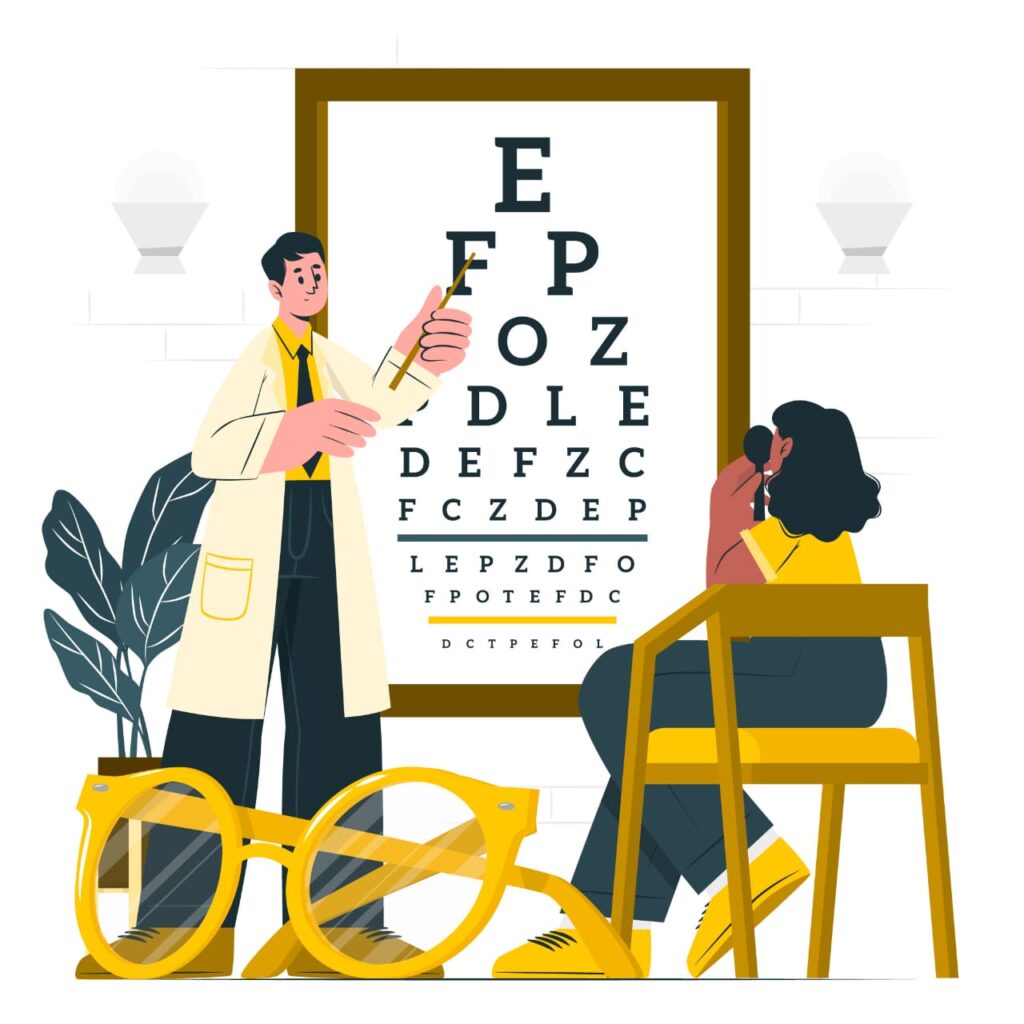
Maintaining healthy vision is not just about seeing clearly—it’s about preventing long-term eye diseases, detecting early signs of systemic health problems, and ensuring your eyes adapt well as you age.
In Dubai, where exposure to digital screens, UV rays, dust, and dry air is part of daily life, regular eye check-ups are especially important.
So, how often should you actually get your eyes tested? Let’s explore the evidence-based guidelines from global eye care authorities and how they apply to life in the UAE.
General Guidelines Based on Age and Risk
According to the American Optometric Association (AOA) and World Health Organization (WHO), the frequency of eye exams depends on age, vision correction use, and medical risk factors.
- Children and Teenagers (Ages 3–18)
Recommended: Every 1–2 years, unless advised otherwise
Vision development is most rapid during childhood.
Uncorrected vision problems can lead to learning difficulties and behavioral issues.
Conditions like amblyopia (“lazy eye”) and strabismus must be detected early for effective treatment.
Dubai Tip: Many children in the UAE spend long hours on tablets and phones—screen time can increase the risk of myopia (nearsightedness).
- Adults (Ages 19–39)
Recommended: Every 2 years, unless advised otherwise
Even with 20/20 vision, routine exams can detect early signs of glaucoma, retinal disorders, or corneal abnormalities.
Those with a family history of eye disease, diabetes, or hypertension should have annual eye tests.
Dubai Tip: Office workers here often experience Computer Vision Syndrome (CVS)—a regular exam can help tailor blue-light protection or anti-fatigue lenses.
- Adults Over 40
Recommended: Every 1–2 years, unless advised otherwise
Presbyopia (difficulty seeing up close) typically begins in your 40s.
Higher risk of glaucoma, cataracts, macular degeneration, and diabetic eye disease.
Eye pressure, optic nerve health, and retina condition must be regularly assessed.
Dubai Tip: Residents of sunny climates like Dubai are at greater risk for UV-related cataracts. Prescription sunglasses or transition lenses may be advised. SUPERIOR OPTICAL LENS –
- Seniors (65 and above)
Recommended: Annually, unless advised otherwise
Increased risk of vision-threatening conditions like age-related macular degeneration (AMD), diabetic retinopathy, and severe cataracts.
Regular eye exams can significantly delay or prevent vision loss with early intervention.
How Lifestyle and Environment in Dubai Affects Eye Health
Living in Dubai introduces several risk factors for eye irritation and long-term issues:
Dust & Sand: Can cause chronic irritation or conjunctivitis
UV Exposure: Linked to early cataract formation and corneal damage
Dry Air & AC Use: Leads to dry eye syndrome
Digital Eye Strain: Increased screen time reduces blinking rate, causing fatigue and blurred vision
These environmental factors make routine eye check-ups essential, even for those without existing eye conditions.
Can Eye Exams Detect General Health Problems?
Yes. During an eye exam, optometrists can detect signs of:
Diabetes (diabetic retinopathy)
High blood pressure (retinal hemorrhages or narrowing)
High cholesterol (plaque in retinal arteries)
Neurological conditions such as optic neuritis or increased intracranial pressure
Free Eye Tests in Deira, Dubai – We Make It Easy
At The Optique Hub, we offer free, comprehensive eye exams using advanced equipment to ensure accuracy and comfort. Whether you’re experiencing vision changes or just doing a routine check-up, our licensed optometrist will:
Conduct a full eye health assessment
Recommend the right eyewear or treatment
Provide honest, expert advice tailored to your needs
Conclusion: Prevention is Better Than Treatment
Your eyes deserve the same care as the rest of your body. Whether you’re young or old, wearing glasses or not, living in Dubai’s unique climate makes routine eye testing a critical part of healthcare.
Visit our clinic at SHOP 3 Deira House Building, Abu Baker Al Siddique Road, Deira, or Contact Us – (by call/whatsapp) at 04-2983830 to book your free eye exam today. Protect your vision—for life.